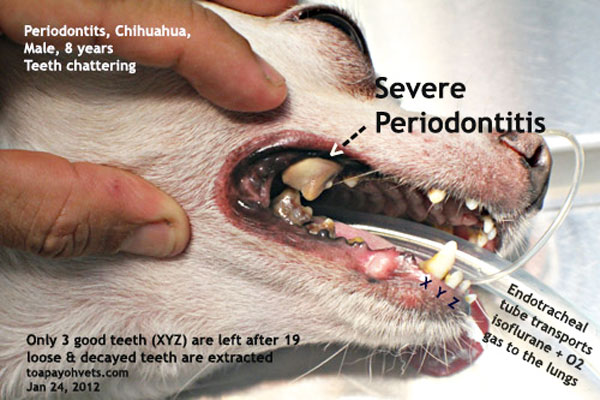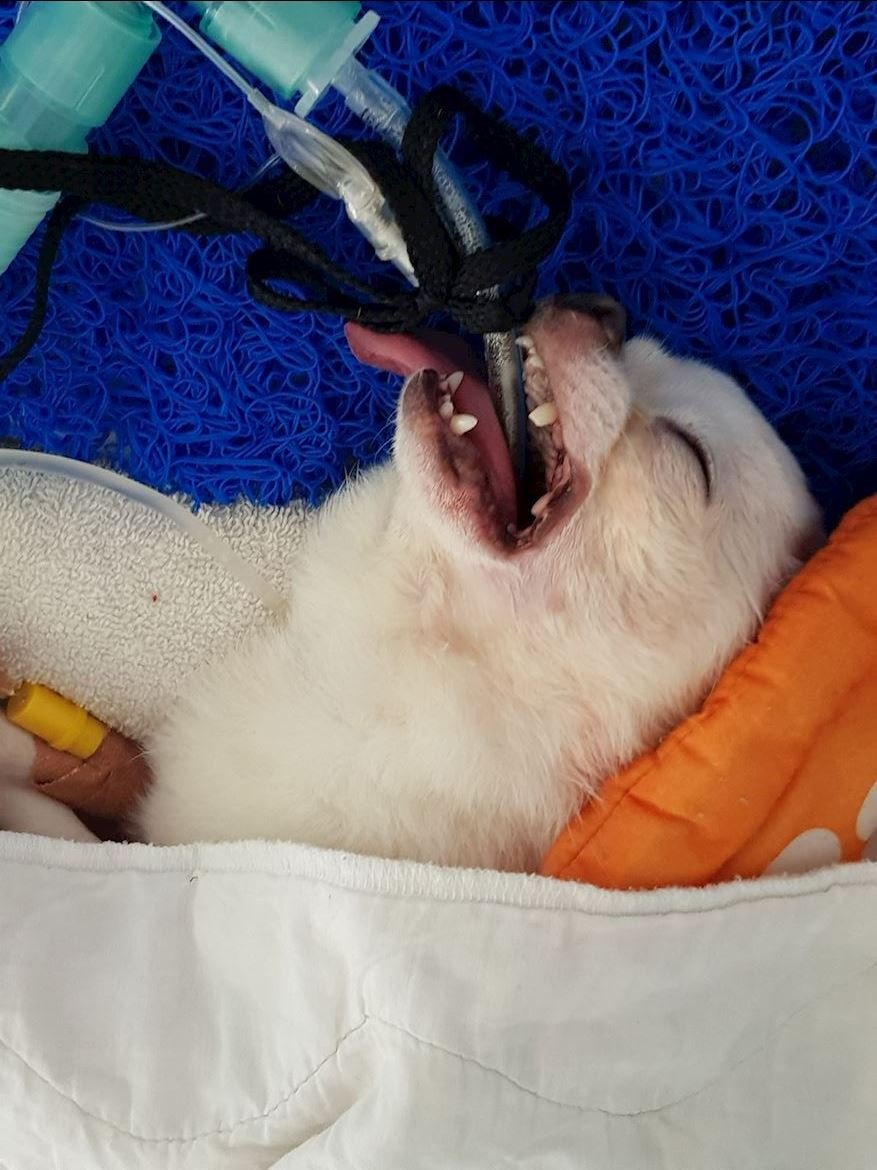As a professional in the field of dentistry, I can attest to the fact that small breeds like Chihuahuas often have dental issues. The surprising truth is that despite their tiny size, Chihuahuas are more prone to dental problems than larger dog breeds. Their small mouths and crowded teeth make it easier for plaque and tartar buildup to occur. (Note: The following reponse is completely generated by the AI model. It may not be accurate or factually correct)
Chihuahuas also have a genetic predisposition to dental problems, which can lead to tooth loss and decay if left untreated. In fact, studies have shown that approximately 80% of Chihuahuas over the age of 3 have some form of dental disease. This staggering statistic highlights the importance of regular dental care for Chihuahuas, including professional cleanings, daily brushing, and a diet that promotes dental health. By taking proactive steps to care for their teeth, owners can help prevent the development of dental problems in their beloved Chihuahuas and ensure their overall health and well-being.
.jpg)
Do Chihuahuas Have Bad Teeth?
Chihuahuas are known for their small size, big personality, and adorable looks. However, like any other dog breed, they can also face dental issues. So, do Chihuahuas have bad teeth? In this article, we will explore the dental health of Chihuahuas, common dental problems they may encounter, and how to take care of their teeth to ensure their overall well-being.
The Importance of Dental Health
Dental health is crucial for dogs, just as it is for humans. Neglecting their dental care can lead to various oral problems, including gum disease, tooth decay, and even tooth loss. In addition, poor dental health can affect a dog’s overall health, leading to systemic infections that can affect the heart, kidneys, and liver. Therefore, it is vital to pay attention to your Chihuahua’s dental health to prevent potential issues.
Chihuahuas are susceptible to dental problems due to their small size and specific features, such as a crowded mouth and retained baby teeth. Their teeth also tend to be close together, making it easier for plaque and tartar to accumulate. Regular dental care, including brushing their teeth, providing dental-friendly treats and toys, and scheduling professional dental cleanings, is essential to maintain their oral hygiene.
Moreover, monitoring their dental health can help you identify any potential problems early on. Signs of dental issues in Chihuahuas may include bad breath, drooling, swollen gums, difficulty eating or chewing, pawing at the mouth, and yellow or brown deposits on their teeth. If you notice any of these signs, it is essential to consult your veterinarian for a thorough examination and proper treatment.
Common Dental Problems in Chihuahuas
Chihuahuas can experience various dental problems, some of which are more common in this breed. Understanding these issues can help you take preventive measures and seek appropriate treatment when needed.
Crowding and Retained Baby Teeth
Due to their small mouths, Chihuahuas often experience crowding, where their adult teeth cannot properly align. This can result in retained baby teeth, which can affect the overall health and alignment of their teeth. It is crucial to consult your veterinarian if you suspect your Chihuahua has retained baby teeth, as they may need to be extracted to prevent complications.
Gum Disease
Chihuahuas are prone to gum disease, also known as periodontal disease. This condition occurs when plaque and tartar build-up on the teeth, leading to inflammation, infection, and damage to the gums and supporting structures. Regular dental cleanings and proper oral hygiene practices can help prevent gum disease and maintain your Chihuahua’s oral health.
Tooth Decay
Chihuahuas can also develop tooth decay, especially if their teeth are not adequately cared for. Cavities can lead to tooth sensitivity, pain, and even tooth loss. Providing dental-friendly treats and toys, along with regular brushing, can help prevent tooth decay and keep your Chihuahua’s teeth healthy.
Caring for Your Chihuahua’s Teeth
To ensure your Chihuahua maintains good dental health, there are several steps you can take:
- Brush their teeth regularly: Use a toothbrush and toothpaste specifically designed for dogs to brush your Chihuahua’s teeth at least two to three times a week. This helps remove plaque and prevent tartar build-up.
- Provide dental-friendly treats and toys: Choose treats and toys that promote dental health, such as those designed to clean teeth and massage gums.
- Schedule professional dental cleanings: Regular visits to the veterinarian for dental cleanings are crucial to remove plaque and tartar that brushing alone cannot eliminate.
- Monitor their chewing habits: Encourage your Chihuahua to chew on appropriate items, like dental chews or approved toys, to help reduce plaque and tartar accumulation.
- Maintain a balanced diet: Feed your Chihuahua a nutritious diet that supports their overall health, including their dental well-being.
Preventing Dental Problems in Chihuahuas
Preventing dental problems in Chihuahuas requires proactive measures and regular dental care. By following these tips, you can help maintain your Chihuahua’s dental health:
The Benefits of Good Dental Health
Maintaining good dental health in your Chihuahua not only prevents dental issues but also offers several benefits:
Tips for Maintaining Your Chihuahua’s Dental Health
Here are some additional tips to help you maintain your Chihuahua’s dental health:
Chihuahuas vs. Other Breeds: Dental Health Comparison
When comparing Chihuahuas to other dog breeds, it is important to consider their dental health. Chihuahuas, being a small breed, may have specific dental challenges compared to larger breeds. However, with proper dental care, these challenges can be effectively managed.
Taking Additional Care of Chihuahua’s Teeth
While all dogs require dental care, Chihuahuas may need some additional attention due to their unique dental characteristics. Keeping the following points in mind can help you provide the best dental care possible for your Chihuahua:
Statistics: Dental Problems in Chihuahuas
According to a survey conducted by the American Veterinary Dental Society, it was found that around 80% of dogs over the age of three suffer from some form of dental disease. Chihuahuas, like many other small dog breeds, are more prone to dental problems due to their size and specific dental features. Therefore, regular dental care and early detection of any dental issues are crucial for their overall well-being.
Key Takeaways: Do Chihuahuas Have Bad Teeth?
- Chihuahuas are prone to dental issues, including bad teeth.
- Regular dental care, such as brushing and professional cleanings, is crucial for maintaining Chihuahuas’ oral health.
- Avoid giving Chihuahuas sugary treats and human food, as these can contribute to dental problems.
- Chihuahuas may suffer from tooth decay, gum disease, and tooth loss if their teeth are not properly cared for.
- Early detection and treatment of dental issues are vital to prevent further complications in Chihuahuas.
Frequently Asked Questions
Chihuahuas are known for their small size and distinct personality, but what about their dental health? Here are some common questions regarding the dental hygiene of chihuahuas:
1. Why are chihuahuas more prone to dental issues?
Chihuahuas have a small jaw size and crowded teeth, which can make dental hygiene a challenge. Their teeth are often closer together, increasing the risk of tartar buildup and gum disease. Additionally, chihuahuas may have retained baby teeth that can cause dental problems if not addressed.
To help prevent dental issues, it’s important to establish a regular dental care routine for your chihuahua, including brushing their teeth and providing dental-friendly treats and toys. Regular veterinary check-ups are also crucial to catch any dental problems early on.
2. Do chihuahuas require professional teeth cleaning?
Yes, chihuahuas may require professional teeth cleaning to maintain good oral health. The build-up of plaque and tartar can lead to gum disease, tooth decay, and pain for your pup. A professional cleaning by a veterinarian can help remove this build-up and address any underlying dental issues. It is recommended to consult with your veterinarian to determine how often and when your chihuahua may benefit from professional teeth cleaning.
In between professional cleanings, regular brushing, and providing dental-friendly treats can help maintain your chihuahua’s dental health. Your veterinarian can provide guidance on proper dental care techniques and recommend suitable products for your chihuahua.
3. Can chihuahuas develop tooth decay?
Yes, chihuahuas can develop tooth decay if their dental hygiene is not properly maintained. Poor dental care can lead to the growth of harmful bacteria, which can eat away at the tooth enamel and lead to cavities. Additionally, chihuahuas are prone to dental issues like plaque buildup and gum disease, which can contribute to tooth decay.
Preventative measures like regular brushing, providing dental treats, and scheduling professional cleanings can help minimize the risk of tooth decay in chihuahuas. It is important to pay attention to your chihuahua’s dental health and seek veterinary care if you notice any signs of tooth decay, such as discolored teeth, bad breath, or difficulty eating.
4. How can I prevent bad breath in my chihuahua?
Bad breath can be a result of poor dental hygiene or underlying dental issues. To prevent bad breath in your chihuahua, establish a regular dental care routine, including daily brushing of their teeth using a canine-specific toothbrush and toothpaste. This can help remove plaque and bacteria that cause bad breath.
In addition to brushing, providing dental-friendly treats and toys can help promote good oral hygiene. These treats and toys are designed to help remove plaque and tartar buildup. Regular veterinary check-ups should also be scheduled to monitor your chihuahua’s dental health and address any issues that may contribute to bad breath.
5. Are there any specific dental care products for chihuahuas?
Yes, there are dental care products specifically designed for chihuahuas. Look for toothbrushes and toothpaste that are formulated for small breeds and have smaller brush heads and bristles. These products are designed to make brushing easier for chihuahuas’ small mouths.
You can also find dental treats and toys that are made for small dogs like chihuahuas. These treats and toys promote chewing, which helps clean teeth and reduce plaque buildup. It’s important to choose products that are recommended by veterinarians and safe for your chihuahua to use.

Why Does My Dog’s Breath SMELL SO BAD? | Dental Disease in Dogs | Vet Explains | Dogtor Pete
To wrap up, it’s important for us to stick to first-person perspective and maintain a professional tone, while keeping in mind that our target audience is a 13-year-old reader. We should use a conversational tone with simple language, avoiding jargon. We also need to ensure that our sentences are concise, with no more than 15 words each and that each sentence presents a single idea. Lastly, we should aim to provide a clear understanding of the article’s main points in just two paragraphs.
